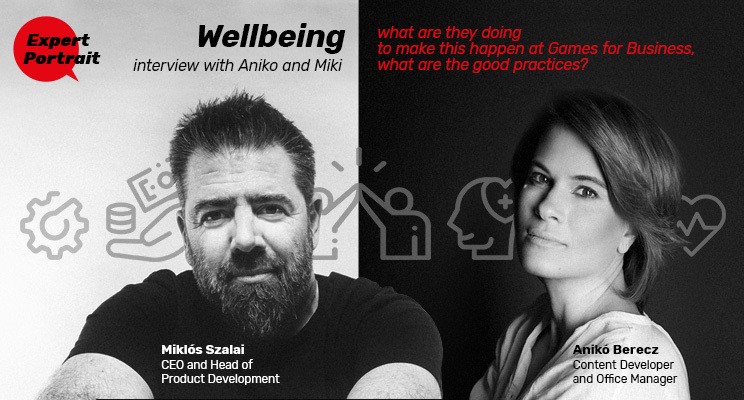
Well-being at work is a hot topic these days. Why is it important to you? What is the essence, the quintessence of G4B well-being?
Miki: There have been a lot of articles lately about well-being at work. I believe that it's important to create a supportive environment, where my colleagues feel comfortable, can thrive, and let their creativity flow freely. Of course, it's also important that they love what they do and want to soar, as this has an impact on the quality and effectiveness of their work.
Anikó: Yes, it's been a buzzword recently and employers are facing increasing expectations in this area. The labor shortage and COVID have restructured the labor market even more and as I see, employees are more honest when expressing their needs.
I agree with Miki that it’s a hot topic nowadays, but it is clear that a good environment, a good atmosphere and, of course, anything beyond these that makes colleagues feel important and that they matter, are necessary for effective work. The key, I think, is balance, and perhaps it often depends on both parties.
What tools do you have in place to make employees feel comfortable at work?
Miki: Of course, it is natural to meet basic comfort needs: coffee, tea, and water are already "basic services". I also consider it important - and a personal goal actually - that my leadership style creates a positive atmosphere in the workplace. It is essential to have good communication in the team, so that my colleagues know and feel that they can express their opinion openly and not face any disadvantages for it in any way. Of course, sometimes having a colleague responsible for the mood also helps relieve the tension: our office dog, Lujzi, perfectly fills this position.
Anikó: A normal, comfortable environment is fundamental. Beyond this, the needs and priorities of the employees are very different: some are motivated by flexible working hours, some by the possibility of working from home, some by financial benefits, and some even by the smallest things. This is why it is important to differentiate the needs and to design benefits and programs in such a way that everyone can find a motivating element in the "portfolio". There should be time and energy for us to deal with this. Unfortunately, as a small company we obviously do not have an infinite budget, but I believe that colleagues appreciate even the little things. In addition to the basics Miki mentioned, company breakfasts, lunches and team activities are always successful. To have a "little darling" in the office does wonders: Lujza absolutely cheers everyone up.
How do you create a positive and inclusive work environment at Games for Business and how does this help improve the emotional well-being of employees?
Miki: To my understanding trust is a two-way street, it must be mutual - you have to trust each other, you have to trust that both parties can rely on the other at work. That employees will do their job to the best of their ability and the employer will provide the work, conditions, feedback, support, and inspiration. Everyone must be listened to, everyone's opinion matters. Be open to each other and create a good working environment where the team can work well together. Company days, company events, birthday cakes, lunches, and coffee together etc. are all important.
Anikó: I don't think we've ever had a problem with positive attitude and inclusion as a team. Correct and honest, but also constructive feedback is the goal when evaluating employees. Even in his previous positions, Miki always paid attention to his colleagues, and even now, to the best of his ability, he always tries to help.
Are there any issues that receive special attention as the holidays approach?
Miki: Every year, we try to do something special for our colleagues and also try to find a cause that the whole team can support as part of our social responsibility.
Anikó: I hope this is not just my passion - and I can always find a partner in crime - to decorate the office for Christmas. I consider this another important little detail that we prepare together for the end of the year, for rest, for the holidays. During the holidays the office is closed, everyone except us is on vacation, and we respect that. This is family time.
You have two completely different jobs, but you are both responsible for the same important aspect, how can you support each other in this?
+ How do you look after your own mental and physical well-being? What works for you?
Miki: We always support each other as a couple, so it works well here too. In addition to a lot of coordination and discussion, it is important for both of us to have our own area of decisions and responsibilities, which should never be mixed up.
Of course, sometimes it is very difficult to draw the line between work and private life. But lately, we have been paying explicit and very conscious attention to separate them, both in terms of the quality of our activities and in terms of working time. It is important to fully unwind in the evenings and at weekends, to spend quality time with each other and with our children. We also try to make time for sports and travel.
Anikó: I am responsible for the ideas and their implementation, and I always try to give something extra as much as our possibilities allow. But it is difficult to come up with and implement things that will please everyone - even in a small team like ours. Fortunately, Miki always supports me and everything I do in this regard.

